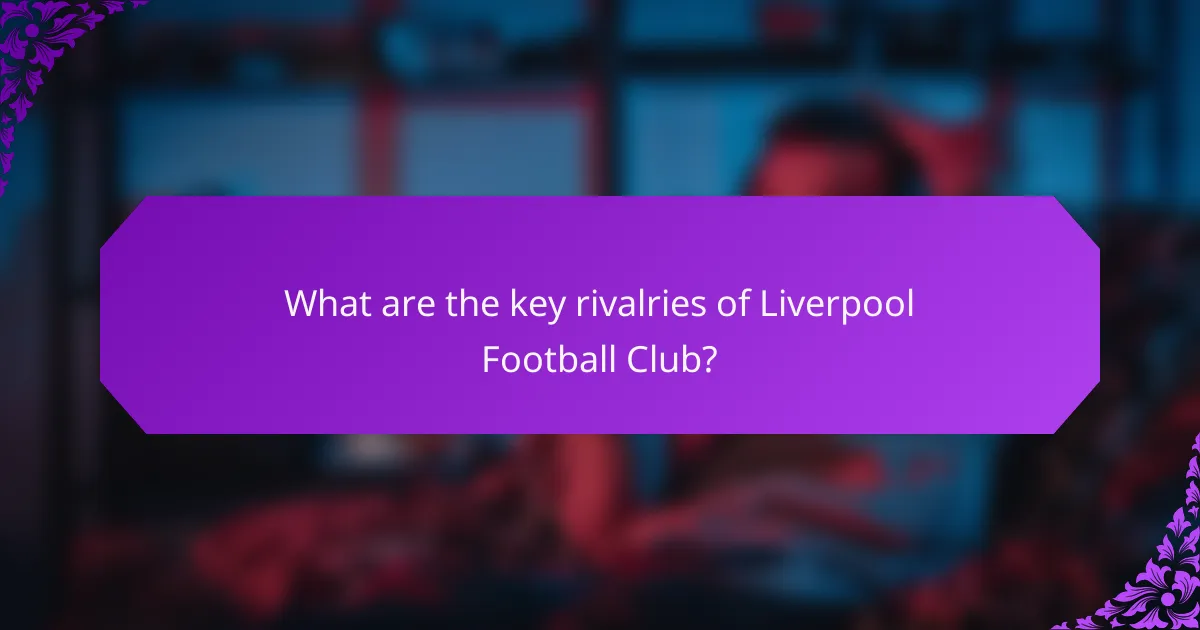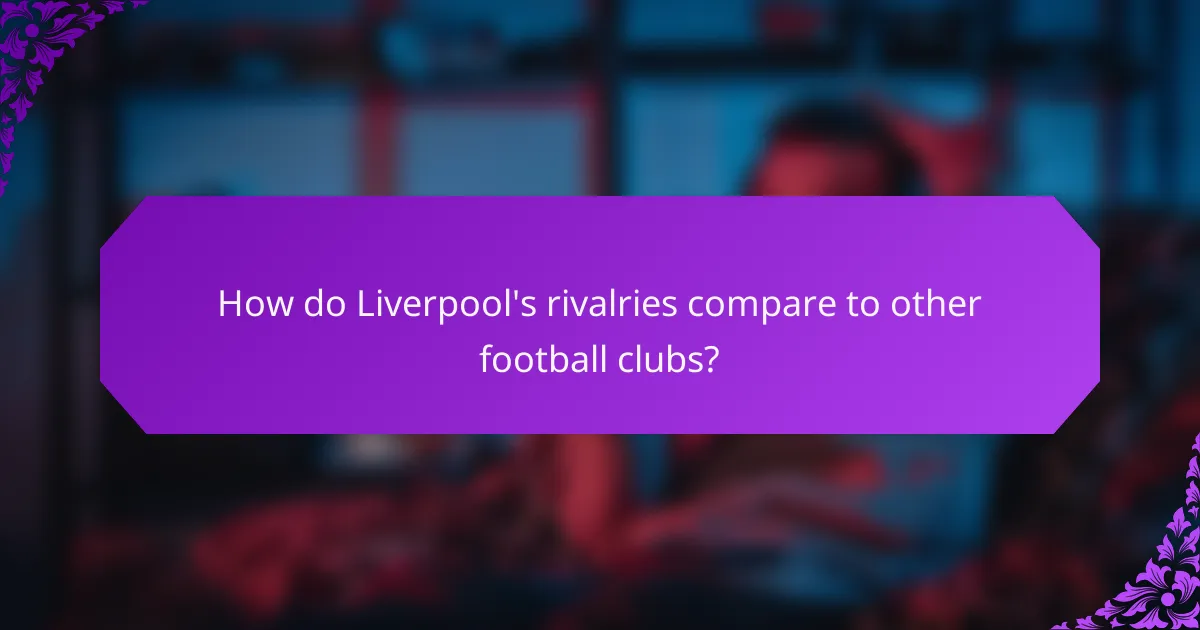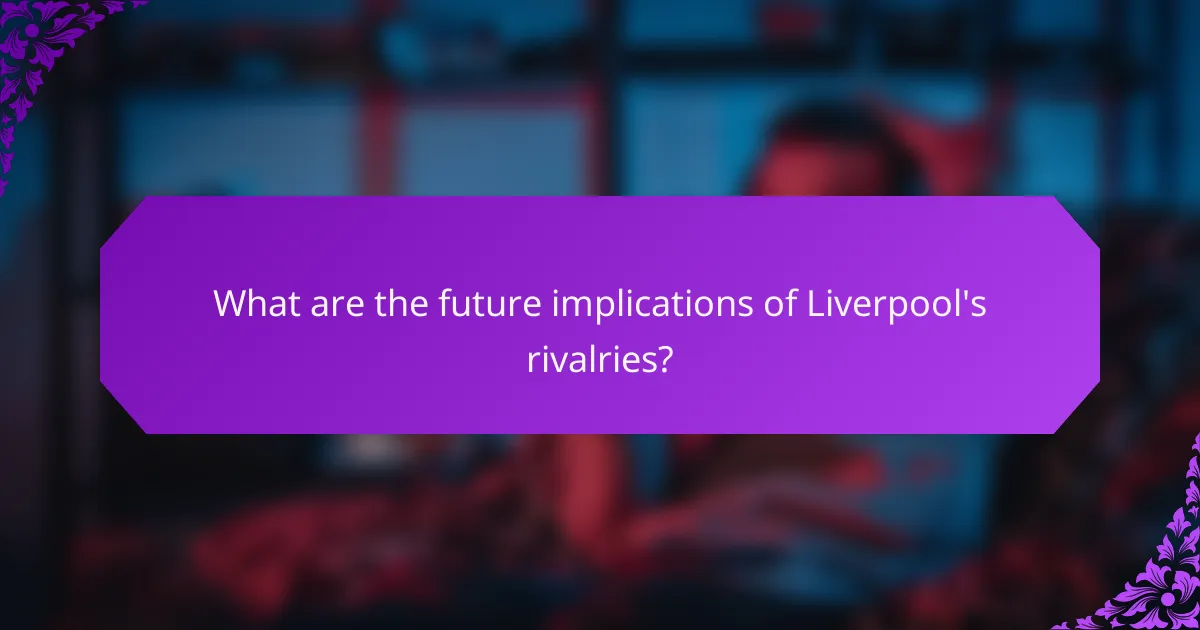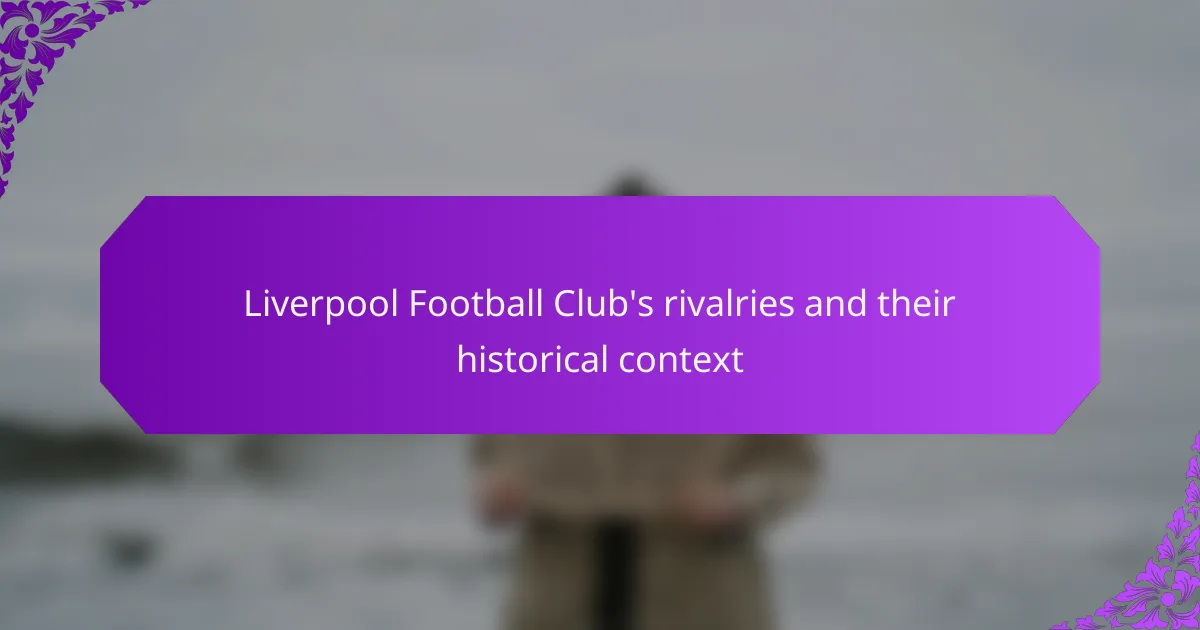Liverpool Football Club is known for its intense rivalries, primarily with Manchester United, Everton, Chelsea, and Arsenal. The rivalry with Manchester United is deeply rooted in historical competition for dominance in English football, while the Merseyside Derby against Everton emphasizes local pride due to the clubs’ close proximity. Liverpool’s encounters with Chelsea have gained significance in recent years, and their historical matches against Arsenal, especially during the 1980s, further enrich the club’s competitive narrative. These rivalries not only shape Liverpool’s identity but also enhance fan engagement and influence future club dynamics, including player recruitment and global brand expansion.

What are the key rivalries of Liverpool Football Club?
Liverpool Football Club has several key rivalries. The most prominent is with Manchester United. This rivalry is rooted in historical competition for dominance in English football. Another significant rivalry is with Everton, known as the Merseyside Derby. This local rivalry highlights the close proximity of the two clubs. Additionally, Liverpool has a fierce rivalry with Chelsea, intensified by competitive encounters in recent years. The matches against Arsenal also hold historical significance, particularly during the 1980s. These rivalries contribute to the club’s rich footballing heritage and passionate fan culture.
How did these rivalries develop over time?
Liverpool Football Club’s rivalries developed through historical events and competitive matches. The club’s rise in the late 19th century established its prominence. Rivalries with clubs like Manchester United intensified during the 20th century due to both teams’ successes. Key matches, such as the FA Cup finals and league deciders, heightened tensions. Geographic proximity contributed to the fierce rivalry with Everton, known as the Merseyside Derby. Cultural and social factors also played a role in shaping these rivalries. Over time, fan interactions and media coverage further fueled the competitive spirit. Historical narratives, such as the Heysel Stadium disaster in 1985, added complexity to rivalries. These elements combined to create a rich tapestry of competition surrounding Liverpool FC.
What historical events contributed to the formation of these rivalries?
The historical events that contributed to the formation of Liverpool Football Club’s rivalries include the establishment of competitive leagues and significant matches. The founding of the Football League in 1888 intensified local rivalries. Liverpool’s rise in the early 20th century led to fierce competition with clubs like Everton, their city rivals. The Merseyside Derby became a focal point for local pride. Additionally, Liverpool’s success in the 1970s and 1980s created rivalries with clubs such as Manchester United. The 1985 European Cup final, marked by tragedy, intensified animosity with Juventus. These events shaped the passionate rivalries that exist today.
How have fan cultures influenced these rivalries?
Fan cultures have significantly influenced rivalries in football, particularly for Liverpool Football Club. The passionate support from Liverpool fans creates an intense atmosphere during matches. This fervor often escalates rivalries with clubs like Manchester United and Everton. Historical events, such as the Hillsborough disaster, have shaped fan identities and rival perceptions. Fans often engage in chants and displays that reinforce these rivalries. Social media has amplified fan interactions, leading to heightened tensions. The cultural narratives surrounding these rivalries are often passed down through generations. Overall, fan cultures serve as a driving force in the intensity and longevity of football rivalries.
What are the most notable matches in Liverpool’s rivalries?
Liverpool’s most notable matches in rivalries include the encounters with Manchester United, Everton, and Chelsea. The match against Manchester United on March 2, 2014, ended in a 3-0 victory for Liverpool at Old Trafford. This match was significant as it showcased Liverpool’s dominance during that season.
In the Merseyside Derby against Everton, the match on December 2, 2018, ended in a dramatic 1-0 win for Liverpool, solidifying their local supremacy. Another key match occurred in the FA Cup against Chelsea on May 5, 2006, where Liverpool triumphed 2-1, further intensifying their rivalry.
These matches highlight the competitive nature and historical context of Liverpool’s rivalries. Each encounter has contributed to the rich narrative of Liverpool Football Club’s storied history.
Which games are considered the most memorable in Liverpool’s rivalry history?
The most memorable games in Liverpool’s rivalry history include the 1986 FA Cup final against Everton. Liverpool won that match 3-1, securing a significant trophy. Another notable game is the 2001 FA Cup final, where Liverpool defeated Arsenal 2-1. The 2005 UEFA Champions League final against AC Milan is also legendary, as Liverpool came back from a 3-0 deficit to win in a penalty shootout. The 2018 Premier League match against Manchester City, where Liverpool won 4-3, is remembered for its intense atmosphere. Each of these matches highlights the fierce competition and historical significance of Liverpool’s rivalries.
What impact did these matches have on the club’s legacy?
The matches significantly shaped Liverpool Football Club’s legacy. They established the club as a dominant force in English football. Key victories against rivals enhanced the club’s reputation and fanbase. Historic matches contributed to a rich tradition of rivalry, intensifying local and national support. The club’s success in these encounters is reflected in numerous trophies won. For example, Liverpool has claimed 19 league titles and 6 European Cups. These achievements fostered a culture of excellence and ambition within the club. Overall, the matches solidified Liverpool’s identity and historical significance in football.

How do Liverpool’s rivalries compare to other football clubs?
Liverpool’s rivalries are among the most intense in football. Their primary rivals include Manchester United and Everton. The Merseyside Derby against Everton is one of the oldest rivalries in English football. This derby features a local clash, highlighting regional pride. Liverpool’s rivalry with Manchester United is fueled by historical competition for titles. Both clubs have a rich history, with numerous league championships and European successes. This rivalry often transcends the pitch, involving deep-seated fan emotions. Compared to other clubs, Liverpool’s rivalries are characterized by strong historical narratives and passionate fanbases. The intensity of these rivalries is reflected in matchday atmospheres and fan interactions.
What makes Liverpool’s rivalries unique in the football world?
Liverpool’s rivalries are unique due to their deep historical roots and intense local significance. The club’s rivalry with Manchester United is fueled by both geographical proximity and historical competition for titles. Liverpool and Everton share the Merseyside Derby, representing a local clash that emphasizes community identity. The passionate fan culture amplifies these rivalries, with high-stakes matches often resulting in fierce atmospheres. Additionally, Liverpool’s European rivalries, particularly with clubs like AC Milan, showcase a competitive legacy on an international stage. These factors together create a distinctive rivalry landscape that is rich in cultural and historical context.
How do historical context and geography play a role in these rivalries?
Historical context and geography significantly influence Liverpool Football Club’s rivalries. The club’s rivalry with Manchester United stems from industrial competition and regional pride. Both cities experienced economic growth during the Industrial Revolution, leading to a fierce competition for resources and recognition. Geographically, the proximity of Liverpool and Manchester intensifies their rivalry, making matches highly charged events.
Additionally, the historical context of the Merseyside Derby with Everton is rooted in local identity. Both clubs were founded in the 19th century, and their shared history creates a deep-seated rivalry. The geographical closeness of the two clubs, situated within the same city, adds to the intensity of their encounters. These historical and geographical factors contribute to the passionate atmosphere surrounding Liverpool’s rivalries.
What similarities exist between Liverpool’s rivalries and those of other clubs?
Liverpool’s rivalries share similarities with those of other clubs, primarily in intensity and historical significance. Many clubs have rivalries rooted in geographic proximity, such as Manchester United and Manchester City. These rivalries often reflect local pride and cultural identity. Additionally, rivalries frequently arise from competitive success, as seen with Arsenal and Tottenham Hotspur. This competitive nature fuels fan engagement and animosity. Historical events, like key matches or controversies, also shape these rivalries, similar to Liverpool’s clashes with Everton. Overall, the emotional investment and passion of supporters are common threads in rivalries across football clubs.
Why are rivalries important to Liverpool Football Club?
Rivalries are important to Liverpool Football Club because they enhance the club’s identity and fan engagement. Intense rivalries, such as those with Manchester United and Everton, create a competitive spirit that motivates players. These matches significantly influence the club’s history and legacy, contributing to its rich tradition. Rivalries also generate substantial media attention and revenue through ticket sales and merchandise. The passion surrounding these games fosters a strong community among supporters, reinforcing loyalty. Historical victories in rival matches, like the 1986 FA Cup final against Everton, are celebrated moments that define the club’s narrative. Overall, rivalries shape Liverpool’s culture and contribute to its ongoing success.
How do rivalries affect team performance and morale?
Rivalries significantly impact team performance and morale. Intense rivalries can elevate a team’s competitive spirit. Players often perform better due to heightened motivation in rivalry matches. For example, Liverpool’s matches against Manchester United showcase increased player effort and focus. This competitive environment fosters team unity and enhances morale. Research indicates that teams often experience a psychological boost during rivalry games. The emotional stakes involved can lead to improved performance metrics. Historical data shows that Liverpool has a strong winning record in key rivalry matches, further validating this effect.
What role do rivalries play in the club’s identity and community engagement?
Rivalries play a crucial role in Liverpool Football Club’s identity and community engagement. They foster a strong sense of belonging among fans. This connection enhances the club’s cultural significance in the community. Rivalries, such as those with Manchester United and Everton, create intense matchday atmospheres. These matches draw large crowds, strengthening local economic activity. Historical context shows that rivalries have shaped fan traditions and club narratives. Engaging with rivalries allows Liverpool to build a passionate supporter base. This engagement often leads to community events and initiatives centered around match days. Overall, rivalries are integral to Liverpool’s identity and its relationship with the community.

What are the future implications of Liverpool’s rivalries?
Liverpool’s rivalries will continue to shape its identity and fan engagement. These rivalries foster intense competition, driving performance on the pitch. Historical rivalries, such as those with Manchester United and Everton, create significant matchday atmospheres. Future implications include increased viewership and revenue from high-stakes matches. The emotional investment of fans will likely deepen, enhancing loyalty to the club. Rivalries may also influence player recruitment, as top talents are drawn to clubs with rich competitive histories. Additionally, the global expansion of these rivalries could enhance Liverpool’s brand internationally. Overall, the future of Liverpool’s rivalries will play a crucial role in its ongoing legacy in football.
How might changing dynamics in football affect these rivalries?
Changing dynamics in football can significantly impact rivalries. Factors such as player transfers, managerial changes, and financial investments alter team competitiveness. For instance, when a rival team strengthens its squad, it can intensify the rivalry. Historical rivalries may shift in intensity based on recent performances. For example, Liverpool’s rivalry with Manchester United has fluctuated with each club’s success. Changes in fan engagement and social media presence also reshape how rivalries are perceived. These dynamics can lead to new rivalries emerging while others may diminish. The evolving landscape of football continuously influences the nature of these competitive relationships.
What trends are emerging in fan engagement related to rivalries?
Emerging trends in fan engagement related to rivalries include increased use of social media platforms. Fans are leveraging these platforms to express their loyalty and rivalry sentiments. This engagement fosters a sense of community among supporters. Live streaming of matches and events has also become popular, allowing fans to connect in real-time. Virtual reality experiences are enhancing the rivalry atmosphere by providing immersive experiences. Additionally, clubs are hosting fan events that celebrate rivalries, strengthening connections. Data shows that fan engagement during rivalry matches leads to higher attendance and merchandise sales. These trends reflect the evolving landscape of sports fandom, particularly for clubs like Liverpool.
What can fans learn from Liverpool’s rivalries?
Fans can learn about the passion and intensity that rivalries bring to football. Liverpool’s rivalries, particularly with Manchester United and Everton, showcase the historical significance of competition. These rivalries highlight the importance of local pride and identity. Fans witness how rivalries can influence team performance and fan engagement. The emotional investment in these matches fosters a sense of community among supporters. Additionally, understanding the context of these rivalries can deepen fans’ appreciation for the club’s legacy. Historical matches often serve as pivotal moments in Liverpool’s narrative. Overall, rivalries teach fans about loyalty, history, and the spirit of competition in football.
How can understanding rivalries enhance the matchday experience?
Understanding rivalries enhances the matchday experience by intensifying fan engagement and creating a vibrant atmosphere. Rivalries often evoke strong emotions among supporters. This emotional connection can lead to increased attendance and vocal support during matches. For instance, Liverpool’s rivalry with Manchester United generates heightened anticipation and excitement. Historical context adds depth to these rivalries, making matches more than just games. Fans appreciate the stories and significance behind the rivalries, which enriches their experience. This understanding fosters a sense of community among supporters. Engaging with the rivalry narrative can enhance pre-match activities and discussions. Ultimately, it transforms the matchday into a memorable event filled with passion and history.
What best practices can fans adopt to foster positive rivalries?
Fans can foster positive rivalries by promoting respect and sportsmanship. Encouraging friendly banter rather than hostility helps maintain a positive atmosphere. Engaging in community events with rival fans can build mutual understanding. Supporting charitable initiatives together can strengthen bonds beyond the rivalry. Celebrating each other’s achievements, even in defeat, promotes goodwill. Avoiding negative behavior, such as violence or hate speech, is crucial for a healthy rivalry. These practices enhance the enjoyment of the sport while preserving the competitive spirit. Positive rivalries can lead to memorable experiences for all involved.
Liverpool Football Club is the main entity discussed in this article, which explores its key rivalries and the historical context surrounding them. The article highlights prominent rivalries, including those with Manchester United, Everton, and Chelsea, and examines how these rivalries developed over time through significant matches and historical events. It delves into the impact of fan culture on these rivalries, notable matches that have shaped their narratives, and the future implications for the club. Additionally, the article addresses how changing dynamics in football and emerging trends in fan engagement may influence these rivalries moving forward.
